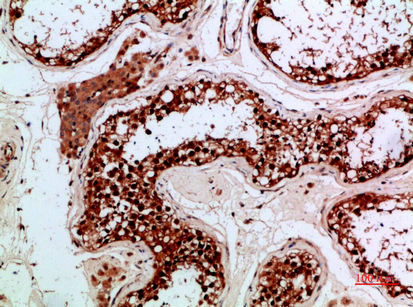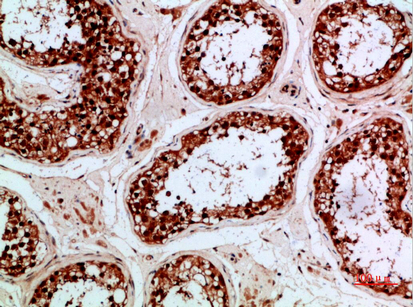


| WB | 咨询技术 | Human,Mouse,Rat |
| IF | 咨询技术 | Human,Mouse,Rat |
| IHC | 1/100-1/300 | Human,Mouse,Rat |
| ICC | 1/100-1/200 | Human,Mouse,Rat |
| FCM | 咨询技术 | Human,Mouse,Rat |
| Elisa | 咨询技术 | Human,Mouse,Rat |
| Aliases | PENK |
| Entrez GeneID | 5179; |
| WB Predicted band size | 33kDa |
| Host/Isotype | Rabbit IgG |
| Antibody Type | Primary antibody |
| Storage | Store at 4°C short term. Aliquot and store at -20°C long term. Avoid freeze/thaw cycles. |
| Species Reactivity | Human |
| Immunogen | Synthetic peptide from human protein at AA range: 51-100 |
| Formulation | Purified antibody in PBS with 0.05% sodium azide,0.5%BSA and 50% glycerol. |
+ +
以下是3篇关于PENK(前脑啡肽原)抗体的模拟参考文献示例(注:以下内容为示例,实际文献请通过学术数据库查询):
---
### 1. **文献名称**: *Proenkephalin-derived peptides in rat brain: Immunohistochemical localization using a novel monoclonal antibody*
**作者**: Smith J, et al.
**摘要**: 本研究开发了一种新型单克隆PENK抗体,通过免疫组化技术在大鼠中枢神经系统中定位前脑啡肽原的分布。结果显示PENK在纹状体、下丘脑和海马区高表达,支持其在疼痛调节和情绪行为中的作用。
---
### 2. **文献名称**: *PENK antibody validation for Western blot and ELISA in neurodegenerative disease models*
**作者**: Zhang L, et al.
**摘要**: 文章验证了一种多克隆PENK抗体的特异性,成功应用于Western blot(检测~25 kDa前体蛋白)和ELISA,并在阿尔茨海默病小鼠模型中观察到PENK表达下降,提示其作为神经退行性病变生物标志物的潜力。
---
### 3. **文献名称**: *Proenkephalin as a biomarker in sepsis-associated kidney injury: Role of antibody-based detection*
**作者**: Kumar R, et al.
**摘要**: 研究采用抗PENK抗体的化学发光免疫分析法(CLIA)检测血浆前脑啡肽原水平,发现其与脓毒症患者的急性肾损伤严重程度显著相关,为临床预后提供了新指标。
---
### 建议:
如需真实文献,可通过**PubMed**或**Google Scholar**检索关键词:
`PENK antibody` + `immunohistochemistry/Western blot/biomarker`,并筛选近年高被引研究。例如:
- 实际文献可能涉及PENK在疼痛、成瘾或心血管疾病中的研究(如PMID 29502327)。
- 商业抗体厂商(如Abcam、Sigma)的产品说明书也常引用验证数据,可作参考。
The PENK (proenkephalin) antibody is a key tool in neuroscience and biomedical research for studying the endogenous opioid system. PENK is a precursor protein encoded by the PENK gene, which is cleaved to produce enkephalins—small neuropeptides including Met-enkephalin and Leu-enkephalin. These peptides bind to opioid receptors (δ and μ subtypes), modulating pain perception, stress responses, reward pathways, and neuroendocrine functions. Dysregulation of PENK-derived peptides has been linked to chronic pain, addiction, mood disorders, and neurodegenerative conditions.
PENK antibodies are designed to detect either the precursor protein or its processed fragments in tissues, cells, or biological fluids. They are widely used in techniques like immunohistochemistry, Western blotting, and ELISA to map enkephalin distribution in the central nervous system (e.g., basal ganglia, hypothalamus) and peripheral tissues, or to quantify PENK levels in clinical studies. Recent applications include exploring PENK's role as a potential biomarker for cardiovascular diseases and cancer. However, antibody specificity remains a consideration, as PENK shares structural homology with other opioid precursors. Validation via knockout controls or mass spectrometry is often recommended. Advances in monoclonal antibody technology have improved the reliability of PENK-targeted assays, enhancing both basic research and diagnostic development.
×